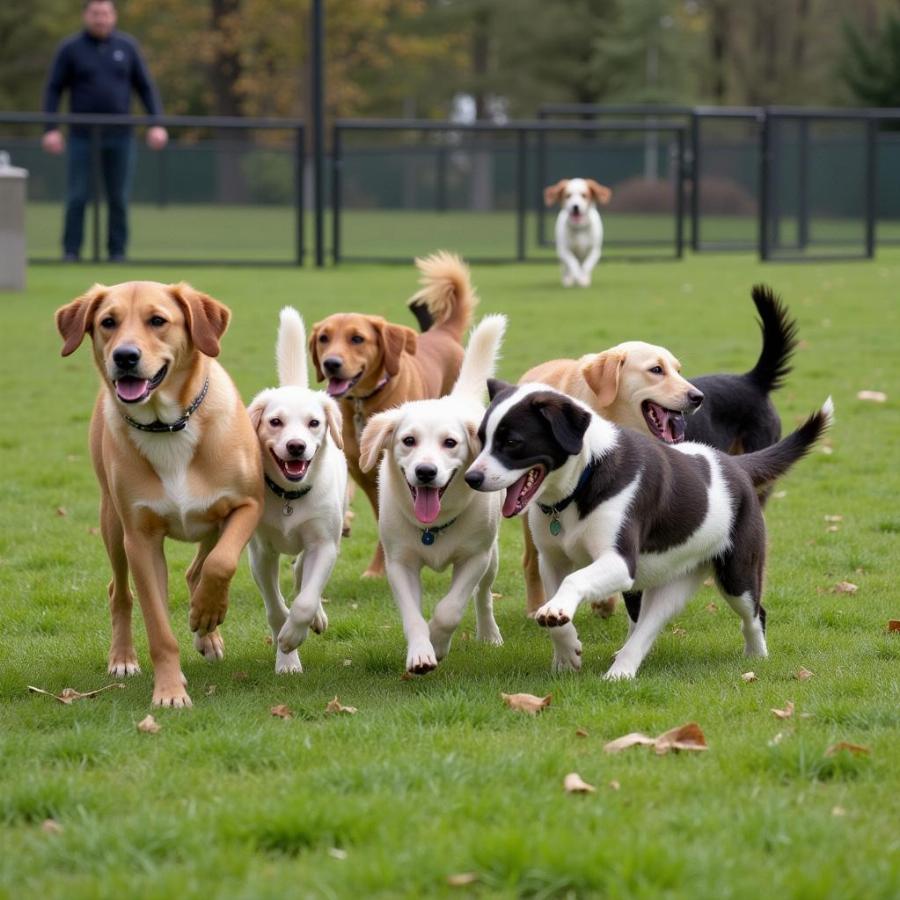Dog parks. They seem like a dream come true: a dedicated space for our furry friends to run, play, and socialize to their hearts’ content. But are dog parks truly beneficial for every dog? As a dedicated dog enthusiast, I’m here to delve into the pros and cons of dog parks to help you make informed decisions for your beloved companion.
The Allure of Dog Parks: Why We Love Them
Let’s face it – watching our dogs gleefully romp around with their fellow canines brings us pure joy. Dog parks offer a plethora of benefits:
- Exercise and Stimulation: For dogs with energy to burn, dog parks provide an outlet to run, jump, and play, fulfilling their need for physical activity.
- Socialization: Interacting with other dogs is crucial for canine social development, and dog parks offer a prime opportunity for pups to practice their social skills.
- Mental Enrichment: The sights, sounds, and smells of a dog park offer mental stimulation, preventing boredom and destructive behaviors.
- Owner Benefits: Let’s not forget about the humans! Dog parks provide a space for owners to connect, share advice, and enjoy watching their furry friends have a blast.
 Dogs playing at a dog park
Dogs playing at a dog park
Potential Risks: When Dog Parks Can Be Problematic
While the benefits of dog parks are undeniable, there are potential risks to consider:
- Unpredictable Behavior: Not all dogs are well-socialized, and even the friendliest dog can have an off day. Unforeseen altercations can lead to injuries or behavioral issues.
- Disease Transmission: Dog parks can harbor parasites, viruses, and bacteria. Even with vaccination and preventative measures, the risk of disease transmission exists.
- Size Disparities: Small dogs can be vulnerable in dog parks with large, boisterous canines. It’s crucial to choose a park with designated areas for different sizes.
- Overwhelming Experiences: For shy, anxious, or reactive dogs, a dog park can be overwhelming and stressful. It’s essential to know your dog’s temperament and comfort levels.
Making Dog Parks Safe and Enjoyable: Tips for Responsible Ownership
Here’s how to maximize the benefits of dog parks while minimizing risks:
- Supervise Actively: Never leave your dog unattended at a dog park. Vigilant supervision allows you to intervene if necessary and ensures your dog’s safety.
- Know Your Dog: Be honest about your dog’s temperament and socialization skills. If your dog is prone to aggression or anxiety, a dog park might not be the best environment.
- Vaccinations and Preventative Care: Ensure your dog is up-to-date on vaccinations and parasite prevention to minimize health risks.
- Start Slowly: Introduce your dog to the dog park gradually. Allow them to acclimate to the environment and other dogs before engaging in full-on play.
- Body Language Awareness: Learn to read canine body language to identify signs of stress, fear, or aggression.
- Pack a Dog Park Bag: Carry essentials such as water, a bowl, poop bags, and a first-aid kit for your dog.
Alternatives to Dog Parks: Exploring Other Options
If a dog park isn’t the right fit for your furry friend, don’t worry! There are plenty of alternatives to provide exercise, socialization, and enrichment:
- Organized Playdates: Arrange playdates with well-known, vaccinated dogs in a controlled environment.
- Dog Walking Services: Hire a reputable dog walker to provide your pup with daily exercise and social interaction.
- Doggy Daycare: Consider enrolling your dog in doggy daycare for supervised play and socialization with other dogs.
- Training Classes: Obedience or agility classes offer mental and physical stimulation while strengthening your bond with your dog.
Conclusion: Dog Parks – A Matter of Individual Needs
Ultimately, the decision of whether or not to frequent dog parks is a personal one. By carefully considering the pros and cons, understanding your dog’s individual needs, and practicing responsible dog ownership, you can create a safe and enriching experience for your furry companion. Remember, each dog is unique, and what works for one may not work for another.
FAQs
Q: What age can puppies go to the dog park?
A: It’s best to wait until puppies are fully vaccinated, typically around 16 weeks of age, before taking them to a dog park.
Q: How can I tell if my dog is enjoying the dog park?
A: Look for loose body language, a wagging tail, and playful interactions with other dogs.
Q: What should I do if my dog gets into a fight at the dog park?
A: Safely separate the dogs immediately. Avoid getting in the middle of the fight yourself. Seek veterinary attention for any injuries.
Need More Advice?
For personalized guidance on dog parks and other aspects of canine care, contact Beaut Dogs at [email protected].
Beaut Dogs is your trusted resource for all things dog-related. We provide expert advice, informative articles, and a supportive community for dog lovers everywhere. Visit us at https://beautdogs.com to learn more.